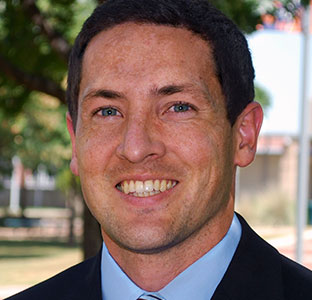UTSA social work scholar studies how religion impacts Mexican migration to U.S.

Steven Hoffman

Steven Hoffman
(March 9, 2015) -- The more outwardly religious Mexican adolescents are, the less likely they are to want to migrate to the United States later in life, according to research by Steven Hoffman, assistant professor of social work in the UTSA College of Public Policy.
Hoffman and his co-investigators from Arizona State University (ASU) -- Flavio Francisco Marsiglia, Foundation professor of Cultural Diversity and Health in the ASU School of Social Work, and Stephanie L. Ayers, associate director of research of the ASU Southwest Interdisciplinary Research Center – studied how religious expression can influence migration aspirations among Mexican adolescents.
Mexico is primarily a Roman Catholic country. Nearly 85 percent of Mexican citizens say that religion is important to them, according to a 2000 study published in the Latin American Research Review.
The researchers hypothesized that Mexican adolescents’ desires to migrate to the U.S. could be predicted by the way in which they expressed religiosity. Internally religious individuals generally place importance on personal religious behaviors, such as reciting prayers and religious study. Externally religious individuals are often heavily involved in community religious expressions, like regular church attendance.
Past research has generally focused on how migration impacts a person’s level of visible religiosity after they have already emigrated to the U.S. Hoffman and his colleagues collected data from more than 700 adolescents aged 14 and 18 enrolled in alternative education programs in the Mexican state of Guanajuato in 2007. Then they narrowed their study to 474 single Catholic youth to examine cultural trends in the greater Mexican populations.
According to the study’s findings, young Catholic men were more likely to want to migrate to the U.S. if they expressed their religiosity internally. The opposite was true of young men who centered their lives among outward expressions of religiosity. Young women were less likely than men overall to aspire to migrate to the U.S., regardless of religious expression.
More than 82,700 Mexicans migrated to the U.S. came from Guanajuato in 2008, according to the Migration Policy Institute. The researchers say that young men from Guanajuato are often expected to emigrate to the U.S. to live and work, or risk being viewed adversely by the community.
Hoffman, Marsiglia and Ayers found that male adolescents who viewed their religious experience as a social exercise felt less pressure to leave their communities. Instead, men with higher internal religious adherence were more likely to succumb to cultural expectations.
“Internally religious young men may perceive themselves to have a stronger connection to the divine and so feel more confident in making the arduous and often dangerous journey to the U.S.,” said Hoffman. “However, our findings could also indicate that internally religious men may feel less connected to their communities and less spiritually fulfilled than other adolescents, which would make them less likely to hesitate to make the journey.”
Hoffman says additional research is needed to better understand the influential connection between religious beliefs and immigration to the U.S.
“Religiosity and Migration Aspirations among Mexican Youth” was published in Vol. 16, Issue 1 of the Journal of International Migration and Integration. Read the study here.
Funding support for the project was provided by the National Institute on Minority Health and Health Disparities (NIMHD; P20MD002316-4) and Arizona State University.
-------------------------------
Learn more about the UTSA Department of Social Work or the UTSA College of Public Policy.
Connect online with UTSA on Twitter, Facebook, YouTube and Instagram.
Events
The UTSA Office of Undergraduate is proud to celebrate National Undergraduate Research with an annual event sponsored by the (OUR) featuring students will showcase undergraduate student research and creative endeavors from all disciplines across campus.
Various LocationsDía en la Sombrilla, formerly Fiesta UTSA, is a festival hosted each spring as a part of Fiesta® San Antonio events. Sponsored by Roadrunner Productions, the event features music, food, confetti, games, event t-shirts, and more.
Sombrilla Plaza and Central Plaza, Main CampusFiesta Arts Fair features contemporary art from more than 100 artists from across the U.S., Fiesta favorite foods, drinks, live music by local and regional performers, and a Young Artists Garden providing opportunities for budding artists to learn, explore and express their creativity.
UTSA Southwest CampusJoin the PEACE Center and Wellbeing Services for Denim Day, a day of learning about the importance of consent and why we wear denim on the last Wednesday of the month each April during Sexual Assault Awareness Month. Stop by our Denim Day display to take a photo in front of our Denim Wall, spin the "Is It Consent?" Wheel, and get a Concha or goodie.
Student Union Window Lounge, Main CampusLearn to use Zotero®, a citation manager that can help you store and organize citations you find during your research. Zotero can generate bibliographies in various styles, insert in-text citations and allow you to share sources with collaborators.
Virtual EventThis event is to achnowlege the graduating seniors and induct the new cohart of scholars to our program.
North Paseo Building (NPB 5.140,) Main CampusCelebrate the accomplishments of College of Education and Human Development, College for Health, Community and Policy, College of Sciences and University College.
Alamodome

